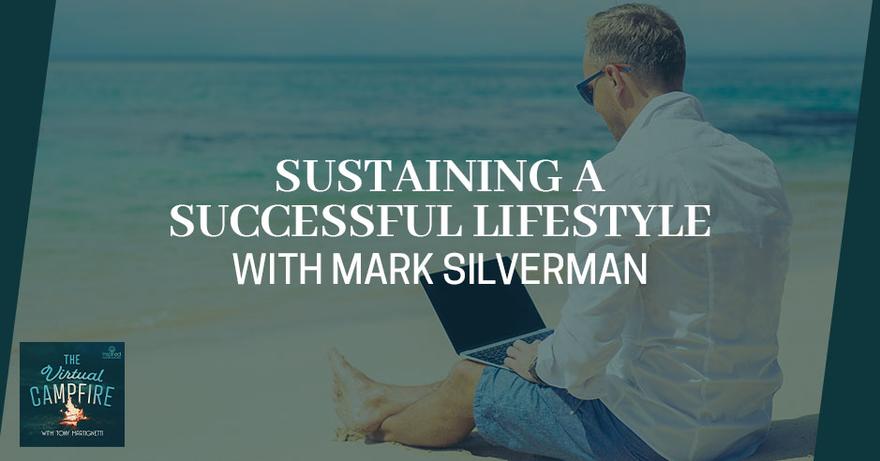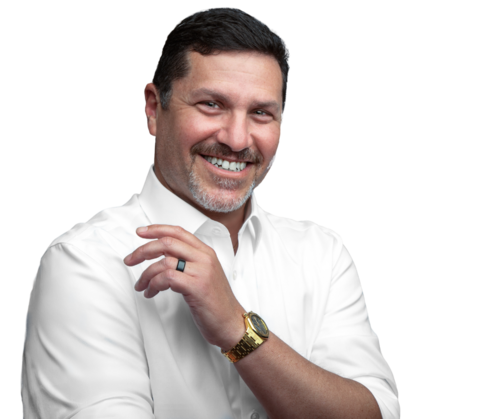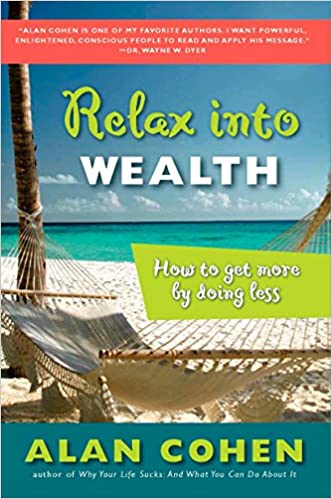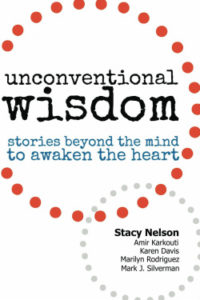Sustaining A Successful Lifestyle With Mark Silverman

What is the secret to sustaining a successful lifestyle? It’s fighting daily distractions to get a hold of your life. Tony Martignetti’s guest in this episode is Mark Silverman, host of the Mastering Midlife podcast and author of Only 10s: Using Distraction to Get The Right Things Done. Mark shares with Tony his story of pursuing a career in coaching and how he built a successful and sustainable lifestyle from it. You can start creating your life today. Regardless of the limitations you feel you’re caged in. Tune in and aspire to be successful!
---
Listen to the podcast here:
Sustaining A Successful Lifestyle With Mark Silverman
Mark Silverman is an expert in leadership resiliency. He is a public speaker, coach, and host of “Mastering Midlife” podcast where he interviews business leaders and other coaches about conquering midlife.
It is my honor to introduce you to my guest, Mark Silverman. He is a sales leader who has generated over $90 million in revenue at some of the world's fastest-growing companies like NetApp, VMware, EMC and ServiceNow. Having succeeded at the highest levels in business, he realized through his own experience and that it was contemporaries that motivations that drive success for many people in the 20s and 30s are often unsustainable into their 40s and 50s.
Perspective, increased responsibilities and pressure call for new skills and mindsets, resilience in order to perform and thrive at peak levels. He is the author of the best-selling book Only 10s: Using Distraction to Get the Right Things Done, which explores the exponential results available when you cultivate a mindset, internal leadership. He's also the author of the upcoming Mastering Midlife: How to Thrive When The World Asks The Most of You. I also like to note he has a podcast that is fantastic that also goes by the name of Mastering Midlife. I would like to welcome you to the show, Mark.
Thank you for having me here. I'm so excited and honored.
I'm looking forward to digging into all of the things that have led you to where you are now. Doing such amazing things in the world and working with powerful people to make them master their midlife.
I don't know what I'm doing in the world. I am the humble servant of my dog. Everything else is gravy.
What I'm going to do is I'm going to create a space for you to share what you're called to share. It's about telling the story but also along the way, we'll uncover the pieces and the themes that make sense for the audience to know. One part of the thing that I talk about is a flashpoint. A flashpoint is a moment in your life that ignited your gifts to the world. I'd love for you to uncover that flashpoint but you can start with some of the key pivot points along the way if that is how you want to get things started.
It's such an interesting conversation to have. Given that when I was in my early twenties, I was homeless, living in my truck, an alcoholic and a drug addict. You would think that would be the pivotal point in my life, getting sober there. It was pivotal in getting me to have a functional life, getting sober, getting a job, getting a college education, getting married and having kids.
It was all inspiring because most people don't get to drag themselves out of the gutter to do that thing. It was later in life after I did that, after I got college-educated, I got married, I had kids. I joke with people that I was homeless and then six years later I was a millionaire. I'm a short Jewish Tony Robbins. For me, that isn't the real pivotal part of life.
Do the things you need to do to climb out of rock bottom.
I did drag myself out of the gutter or grace drag me out of the gutter whatever combination, therefore. It was later in life when I was successful and driving the Lexus Convertible, wearing the gold watch and the Hugo Boss suits, married and two kids when I couldn't sustain it anymore. When that all fell apart, stone-cold sober, that's when the humbling part of life was because I was believing my own line of crap.
I was like, "Mark came from homelessness to living in an expensive house and all that," and I believed all that. It was humbling is that I couldn't keep my marriage going, that I couldn't keep my health going. The stress was too much for me that everything was falling apart around me and having to rebuild who I was. At about 2008, 2009, that is where the pivotal point was, everything being taken away from me and realizing that stone-cold sober, I didn't have alcohol and drugs to blame anything on. It was I who was unsustainable as a going concern and I had to rebuild whatever Mark was going to be.
From the perspective of feeling into this person, who's climbed the mountain, gotten to the very top and with all the pictures of what people view as success and then having to fall to figure out what's meaningful in life.
It's not peacefully humbling. It's horrifying because everything I knew I was, was shattered. If I didn't have kids, I was suicidal. I just didn't want to go on. If I couldn't make my marriage work and sustain whatever or whoever Mark was supposed to be, I didn't want to be here. I knew that if I killed myself, I would pass that legacy on to my children and that was the only reason why I didn't do that.
I'm so glad you mentioned this word legacy and the feeling of having this feeling of what's pulling you back. That's an important concept of knowing that there's something to live for and there's something that is meaningful in your life. It's amazing how profound when you have a child or a loved one who means a lot to you. They keep you going. When I think about people who are lonely out there or feeling like they're going it alone, it's so important to have those allies, no matter where you find them. It sounds like that's something you resonate with.
I used to have the thought that people who were suicidal were selfish. It was such a selfish act and thing to do. Can you imagine the pain someone has to be in to think that people are better off without you? Which is what I felt. I felt people were better off without me. The only people I couldn't have that equation for were my children. No matter what, I didn't think my children were better off without me. That's where the climb back up was. I made sure that I was doing the things I needed to do to climb out of that hole.
Since you've already had such a big range, now you're at the bottom seemingly again, did you feel like the climb back up was something that seemed familiar?
This was completely different because I had no expectations. When I got sober, I was in AA. I was in the Narcotics Anonymous and Debtors Anonymous. I was in all those places and I was around people who were doing that. I was still out with all the other people who were driving sports cars and wearing expensive suits.
I was still out playing in the world of sales. I still had to show up for my kids without the wherewithal to be able to sustain it. When I was in my apartment after getting separated, I remember getting up at 1:00, 2:00, 3:00 in the morning and just walking around my neighborhood, hours in the middle of the night because I couldn't handle being in my body and I just had to walk. I was getting hives and sick and all kinds of stuff.
I heard someone on the radio and this is part of my shtick. When you tell the dramatic story over and over again, it becomes schtick but it's also true. I was so sick and I thought I was going to die and I decided I needed to leave a million dollars for my kids. My career was in the toilet so I decided that year I was going to make a million dollars. I also decided that year I was going to run the Marine Corps Marathon because I wanted my kids to see me do something triumphant when I was down.
I was going to give $60,000 to charity because I just hated myself and I wanted to do something for legacy. I couldn't even run a mile so I trained for the marathon in five months. I ran the Marine Corps Marathon. I made the million dollars. It took two years to make the million dollars but that first year I made $750,000.
After all that, what had happened was my career was back on top. My health was tiptop. Everything was good. My kids and my ex-wife were doing better. My ex-wife called me and she says, "Mark, I was worried about you all year," and then I read an article that said if you're depressed, you should focus on a couple of goals. She says, "You just naturally did what you were supposed to do when you're depressed."
I was like, "Thank you.” I just did what I was desperate to do. Being able to do that was the turning point for me for everything. Climbing out of that, stone-cold sober, not turning to drugs, not drinking the alcohol and staying accountable to my family, my work and myself even when I didn't feel like it and climbing out of that hole.
It took years. I was still depressed a year later. When I looked around, I went, "This is interesting." I started all this self-help stuff. I started reading everything. Brian Johnson's Philosopher's Notes saved my life. Those are summaries of some of the greatest books ever. When I would run, I would listen to these books and I would just soak it all up.
The first year, I didn't kill myself. The second year, I hated myself but I wasn't suicidal. The third year, I didn't hate myself anymore but I was okay to live. In the fourth year, I decided, "I'm going to live until, Jake, my youngest, graduates high school. I'll be okay in living." I'm not going to kill myself but I'm okay if God takes me.
I read a book and you're going to ask me this, “What book had a profound effect on you?” I'll cheat and it was Alan Cohen's Relax Into Wealth. Alan Cohen is a brilliant author. He teaches coaching and a course in miracles. In this book, Relax Into Wealth, a lot of it was a course in miracles, the secret. It's a lot of that stuff.
If you're depressed, focus on specific goals.
There are two things that he said in there that shocked me. One was, "What if you treated yourself the way you treat everybody in your life?" I turned 50 at that time and I was like, "I have never, ever thought that ever.” I wasn’t drunk, I was entitled and all that stuff but I never thought, "What if I treated myself the way I treat everybody else?" The second was like, "What would it be like to be at the top of your list?" I was like, "I'm not even on the list." Those two things were the most profound thing.
During those years of climbing out, I found self-love. It was okay to not only not hate myself, it was okay to love myself. Once I got there, I am not. I called Scott Peck, the author of The Road Less Traveled years ago when the book first came out in the ‘80s. I tracked him down, called his house to find out if I was a person of the lie. That's how badly I thought of myself.
I got his maid and the maid didn't have any answers for me. That's how bad it was. To finally get that I'm worthwhile that I can love myself, that's when this whole coaching thing, that's when I realized, “All I want to do is to shout from the rooftops. I quit smoking and everybody should quit smoking. I love myself. Everybody needs to know this. I didn't know anybody knew this.” I spent the rest of my time, even though I'm an executive coach and I talked about businesses, success and all this stuff. I spend a lot of time helping people forgive themselves, love themselves and what a different world.
I love that you put love into the equation because I get asked a lot about, "Where does emotion belong in work?" I said, "Everywhere because love is the one thing that people don't talk about in work." We're not talking about passionate love. We're talking about love starting with yourself and if you can't find love for yourself, you can't love other people. That could easily be replaced with leading because leadership is love, in my opinion. I'm not sure if you agree.
What I agree with is love isn't a feeling. I can love people and not feel that love. That was an epiphany for me that love is how I show up. Love is where my energy goes. The feeling doesn't have to be there. My feelings are like clouds. I can hate everybody one minute, I can love everybody the next, I can like everybody. I could want to be alone. None of those matters. My thoughts and my feelings are just none of my business. It's how do I choose to show up and that for me is love. Even though I was suicidal, I showed up in love for my ex-wife and my children even if I didn't feel it.
I feel it. You putting that into the room, it's very palpable. Tell me more about what happened as you got your coaching business off the ground because I can only imagine that coming from the place you're coming from, having overcome all the challenges you're coming from, you still have to build a business and get clients and all the things that go along with that. Tell me about the journey of getting a business off the ground.
It's funny because I get asked on podcasts all the time. "What advice do you have for new coaches, Mark?" I'm like, "Keep your job and your health insurance and coach people on the weekends." Don't be a coach because every one of these programs say, "You can have a six-figure business and your lifestyle and you can do it from anywhere."
These people are lying to you and it's not the case. Now people do it but most coaches make $20,000 a year. You're not going to make it. If you come from a corporate environment or a place where you have the expertise and you can transfer that over then you have a consulting business and you have something. I came from the business world so I was lucky. I struggled because I didn't realize that I was becoming an entrepreneur. I was starting a business.

Nobody told me that. When I went to coaching school, it was all about, "Do reflective listening, open your heart and do all this stuff." Nobody told me, "By the way, you're going to have to pay taxes. You're going to have to set up your books. You need to be an S corp.” Nobody told me any of this stuff. I'm going along and not paying attention to the fact that I'm building a business but the way I became a coach, it was Alan Cohen. He had a hunch that I should be a coach and I didn't even know what it was.
When I told my ex-wife about it, she said, "This is what I've been telling you all this time." She says, "You have something that people need to learn." We thought it was human resources and we didn't know what to call what it is I did to be successful and what it is that I imparted to have executives in all these companies want to do business with me. When she found out about coaching, she was like, "That's what I thought you should be."
I decided I was going to go to coach training to be a better sales guy and when I had $2 million in the bank, I was going to become a coach. That's when I decided when I had $2 million over and above what I was giving my ex-wife and what I was giving my kids, I was going to go become a coach because I had my elderly parents, my ex-wife and my two little kids that I was taking care of. Plus, I did have expensive taste.
When I started coaching with Steve Chandler, who was the godfather of coaching. Steve was saying, "Mark, you hate your job. You hate what you do." Being in sales at this point was just eating my soul and I was having trouble because I wanted to coach. I loved the coach training and everything I was doing. I said, "Steve, I can't go do that. All of these people depend on me."
This is where I don't recommend people do what I do. If I could do things differently, I'm very single-threaded. I'm either a sales guy or I'm a coach. I'm either married or I'm not. When Steve said, "Do you think that the people in your life want you to do something you hate and not something that you love?" I'm like, "Yes. They want my money. They need my money to live. My ex-wife lives in a million-dollar house. We need this money.”
He fired me as a client and he said, "I can't coach someone who is not willing to risk and follow their heart." I was devastated but then I talked to my ex-wife and she says, "I trust you. You should go do this. This is your calling." I talked to my mother and she was like, "Don't worry about us." She was lying because they were dependent. They encouraged me. They said, “You were born to do this.”
I hung out my shingle and I had six clients immediately. They were all my old customers. I had some money in the bank. I had some cushions and a runway. I hired Rich Litvin who wrote The Prosperous Coach with Steve Chandler to help teach me how to run a coaching business. I spent all my money on coaches, training, workshops and mastering my craft because I decided if I was going to be a coach, I wanted to be the best in the world.
I was going to learn from the best in the world. I spent three years just traveling around learning how to be the best coach from sex coaches, business coaches, shaman, everybody. It took me four years to make the money I needed. I went on stage at one of Rich's events and I said, "I'm embarrassed to say, I had all the tools.” It took me a while to get over $200,000 a year because I wasn't an entrepreneur. I resented having to market myself. There were so many things I didn't like about running a business. I had to surrender to running a business and that was the hard part for me. My coaching was great. To raise my rates to a point where I could be sustainable, I had six clients when I first started, I was charging a pittance.
You have to be willing to take risks to follow your heart.
It comes to that whole adage. It's simple but it's not easy. That oversimplifies it because there's an element of on paper, everyone says like, "This is what you should do," and then you're like, "Sure, okay." There's an element of getting yourself fully committed and the confidence built to get there. I'm filling into that for you and the journey sounds very familiar.
It was nice to having someone else pay for your American Express, wasn't it? Now you've got to pay for your own.
Take me back into the hardest part of your journey. You've been through so many challenges. What was the biggest setback for you when you started on your journey to becoming who you are?
There are some low points. Let's just talk about this particular coaching business. I'm in my eighth year when I started to run out of money and create debt because I was still giving all this money to the people who needed it. My pride wouldn't let me even say, "I can't give you this." My pride got in my way.
Ramit Sethi says, "Bankruptcy comes slowly and then all at once." I'm living my life. Things are great. My relationship with my ex-wife is great. I'm in a new committed relationship. The coaching business is going well but I'm still bleeding money because I'm still flying here to go work with this person. I'm still spending this stuff.
When it came to looking at my finances a couple of years ago and going, "This is a business." I wrote a book and it sells a ton and everything I do seems to be on paper. People think I'm this unbelievably successful person but I don't know how to run a business and my own finances. The reason I left my marriage with so much money was that my wife never let me spend any money. I call her, I thank her all the time. I'm like, “You were so smart. I am such an idiot. I don't know how to manage money.”
When I finally realized, “You're an entrepreneur. You have a business. You are now an S corp. You now have a payroll. You now do this.” That was the hard part for me. Steven Pressfield wrote a book called Turning Pro and it was my decision to go, "I'm a pro at this. I'm not dabbling at this. This is my business. I charged this much money to work with me. I create these assets and I do these things. I'm my own worst sales manager. Now I have to be my own best sales manager.”
What I did was I got a group of people to who I was accountable because I knew I wouldn't be accountable to myself. I have people who I talked to every week and say, "These are your tens for the week. Do use my own nomenclature. We'll talk to you next Thursday to find out how you did. If you need some work along the way, we'll check on you.”
All of a sudden, this starts turning around. I have a full roster of clients who are paying the type of fees they need to be paying for me to be sustainable to be able to do this. I can give my services away where I want to. Your audience can have my online courses for free. I give stuff away because I would love to coach for free.
One, it's not sustainable for me as a human being. Two, people don't pay for it. They don't step up. Whether their stretch is $10 or $100,000, if they don't stretch, they're not going to value it. That was the hardest thing for me to dig deep and say, "This is a business. This isn't a spiritual venture.” It is spiritual but I thought spiritual would take care of it all and I didn't realize that spiritual is counting on me to be a business guy.
There’s something that gets the wheel going and it gets you out of bed, moving forward and helping people. There's an element of to keep the flywheel going, you have to have the fundamentals and the pieces to keep it going.
I never understood, before enlightenment, I chopped wood and carried water. After enlightenment, I chopped wood and carry water until I had my enlightenment moment. My epiphany, where I was one with the universe and I knew that Mark doesn't exist. I’m like Eckhart Tolle and the Buddha. It's all gone. I come back and I still got to do my laundry and put my taxes aside. "That's right. I am Buddha," and if Buddha were alive now, Buddha’s taught to feed himself. Got it. Chop wood, carry water and know I'm the universe. Now I've got something.
We've covered so much ground and it was such a remarkable story. I know you talk a lot about resilience. There's a lot of range to the emotions that you've had to build along the years. In that vein, would you like to tell people, from your journey, what have you learned that has been the most poignant for you as you move forward?
My little secret is that when people come to me and they say, "Mark, I want to know my purpose and my mission in life." I went to a psychic, who's a brilliant woman. She's an advisor to someone who I know is uber-successful so I trust her. I said, “Shashana, I need to know my purpose and my mission.” She throws her head back and laughs.
She says, "There is no purpose and mission. God doesn't give a crap.” I was like, "What do you mean? Why do any of this?" That was the opening of, "I get to do what I want to do.” It doesn't mean hedonism and hedonism is fine too. I want to be a good father and provider. I want to be a responsible businessman.
All these shoulds and all this prison that we're in is such a fake. Cliches that are true for a hundred, you're in a cage and you have the key. You're in a cage and there's no door and then there is no cage. What do you want to do? I have responsibilities, great. I need health insurance for my kids. I can't quit my job, go to Bermuda and weave baskets. I want to be a responsible dad. “I'll choose to be a responsible dad but I want to weave baskets. I'm going to set up a place in my garage to weave baskets and I'm going to work towards that.” We're not trapped. To me, the biggest revelation is I'm not trapped in what I think I'm supposed to do with my life.
Choosing where you are is empowering to be able to move to where you want to be.
You're always at a choice of what's possible. As soon as you break free from those limitations and you see no matter what age you are, anything's possible. I love that mentality. I say a lot about not putting people in boxes because boxes are very limiting. People create their own boxes sometimes and say, "I can't do that because of this. I love to do that but." We talked about shoulds. Language does make a big impact on people's ability to get things done. Oftentimes, when I'm talking to people, I'm always saying, "What are you saying? How did you say it?” I do the same thing myself.
I want to throw a disclaimer in there though. I don't want to talk from my middle-class white privilege, from my big house. I was homeless. I've had hard times. Viktor Frankl wrote a book called Man's Search for Meaning. He talked about this particular mindset, even being in the concentration camps. What I'm talking about is if you can't see your way to changing your career and this is where the freedom is, it’s choosing what I have now.
Finding where you choose to be in this dead-end job for now because you have to pay the bills. You choose to take care of your elderly parent because you need to or you have a sick kid and you feel stuck in that. Choosing it and deciding, “Who I want to be as the person who takes care of this. Who I want to be as the person who is the janitor. I'm going to be the best janitor I can.”
These are cliches that are true for a hundred. Choosing where you are is so empowering to be able to move to where you want to be. I want to be careful. I'm not talking about this privilege of switching. There's so much power in choosing the place I am right here right now because the truth is that's all there is. We can move in the next moment to something more that we may want or desire.
It's empowering to feel that energy of if I put myself in that place of being able to make choices and being able to have the power of choice. Even though there are a lot of restrictions around me that people put and society puts on you or in history, I've had a lot of challenges around restrictions. If you make the mental, it's very empowering. For me, hearing you say it means a lot. I appreciate you sharing that. I don't even know where to go from here. I can't thank you enough.
I'm an ADD carrier so I do that to people.
Is there anything else that you want to share before we wrap up?
I'm on my own continued journey. I wrote Only 10s years ago. I started writing Mastering Midlife. I'm working with a book coach and a publisher and they've decided that there are three books to be written now. We're doing Only 10s 2.0. Why? Only 10s for me was my journey into realizing I was an owner of my own experience that I needed to choose what I was doing and that all the choices I was making were because of shoulds and fear and all this stuff that went into the mix of the things on my to-do list.

We're rewriting Only 10s. What I notice is the theme in all my writing in the three books that I'm writing all at one time is this one we talked about, the self-forgiveness and this love. Two, the freedom of the cage that there are no shoulds. You can create your life even within the parameters of what it looks like you're stuck and you can start to create your life.
God isn't sitting there with an abacus deciding whether you're good, bad, indifferent, all that stuff. You were given life. For me, the mastering midlife piece is starting to learn who I am. Starting to separate who the conditioned Mark is who the automatic Mark is and the built Mark versus the essence of whatever Mark is in this incarnation.
I don't want to go off too far but to start to separate that automatic stuff and that's what midlife is for me. Midlife is when the automatic Mark, the Mark that was built from childhood through his twenties and the Mark that was built from all the fears and all the experiences is not the Mark I made him want to be. Midlife can be at any time.
This COVID virus has done so much for people to break that spell of who they think they're supposed to be, that false safety to see what they want to create next. That's the theme of all of my work and that's what I would love people to leave with in this show is that you get to explore. Get a pen and a paper and sit and write for twenty minutes every day and you will learn so much about yourself. There's a whole new world in the world you're already living in.
What a great way to close things out, Mark. I have to thank you for the story and the insights. I can't wait to read your book. Thanks for coming to the show. How can people find you if they want to learn more?
If they go to my website MarkJSilverman.com or MasteringMidlife.com, they'll find the podcast and the book. They can sign up for upcoming chapters of the new books. I'm giving away especially if it was the COVID virus, my Leadership Resiliency Program, the Only 10s Program and I'm going to be giving away chapters of the new books.
Thank you to the audience for coming along the journey with us. Thank you, Mark. This is a pleasure.
I'm honored. Thank you for speaking with me.
Important Links:
- Mark Silverman
- Only 10s: Using Distraction to Get the Right Things Done
- Mastering Midlife
- Philosopher's Notes
- Relax Into Wealth
- The Road Less Traveled
- The Prosperous Coach
- Turning Pro
- Man's Search for Meaning
- MarkJSilverman.com
- MasteringMidlife.com
- Leadership Resiliency Program
- Only 10s Program
About Mark Silverman
 The people I work with are already very successful. They are top in sales, run companies, lead divisions and execute on big visions. A common thread is that they know they could do so much more, if they could just focus. Life’s demands, day-to-day business, and the ability to keep to clear priorities slow their march to the next level.
The people I work with are already very successful. They are top in sales, run companies, lead divisions and execute on big visions. A common thread is that they know they could do so much more, if they could just focus. Life’s demands, day-to-day business, and the ability to keep to clear priorities slow their march to the next level.
Each engagement is tailored to the individual or group:
Vision – We will get very specific and clear on what you want to create.
Strategy – Here we focus on what it will take to achieve this vision, making adjustments real time.
Skills/Resources – What do you (and your team) need in order to get where you want to go?
Mindset – Most often the barrier to success is our self. Together we will uncover blind spots, limiting beliefs, and the edge of your leadership to clear the path to your goal or vision.
Action Plan- The clear road map for you and your team to achieve your vision.
What you can expect: After working with me you will more effectively direct your valuable time and attention to get beyond where even you thought you could go.
• Increased effectiveness by taking the right actions
• Increased confidence and quality in your decision making
• Dramatically transform limiting behaviors and habits that hold you back
• Up level to a more impactful and meaningful leadership style
• Elevate your day (your focus) from “Tactical” to “Strategic”
• Transform team dynamics and develop direct reports
• Build your personal brand
• Address challenges in more innovative ways
• Communicate more directly and with more influence
• Increase sales and grow your business
As a Sales Leader, I generated over $90 Million in Revenue at some of the fastest growing companies like NetApp, VMWare, EMC and Service Now. My clients benefit from my vast experience working with CEO’s and Senior Leaders because I know their world. I coach and consult successful individuals on focusing and delivering what is most important in their business and life.
Love the show? Subscribe, rate, review, and share! https://www.inspiredpurposecoach.com/virtualcampfire




0 comments
Leave a comment
Please log in or register to post a comment